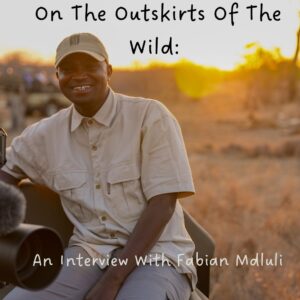Something grey and covered in whiskers was peeking out of the water. A large grey body surfaced as the large nostrils of the creature sucked in air.
“What is that?” My friend shrieked, looking down into the canal. I was flabbergasted; this friend of mine had lived in Florida for most of his life and yet he had never seen a manatee!
“Do they bite?” He was fascinated by this large creature and I proceeded to teach him about manatees.
It dawned on me that some people who live right on the outskirts of wild areas and wildlife never get to see it, or experience it. These people, once they learn about the wildlife surrounding them, care more about preserving it. It’s just a natural result of being exposed to nature and learning about it.
I recently had the pleasure of interviewing a man who knows a lot about this phenomenon. Fabian Mdluli is a wildlife photographer and filmmaker. He recently completed Lauren Arthur and David Eastaugh’s specialized, immersive wildlife filmmaking course that was launched in August 2024. The course covers not only wildlife filmmaking, but also gives students a complete immersion into the African wild. There is a module on animal behavior, ecology, phenomenology and ethics of wildlife filmmaking presented by Lauren. The course introduces the students to the field of impact producing with a guest speaker and helps guide the students in their efforts to combine storytelling with social and behavioral science to drive positive change. Their expert tracker takes students into the bush on foot and teaches them the basic tracks and signs and how to read the environment around them for more immersive filmmaking. David teaches the students to understand how to use the equipment, build specialized wildlife filming rigs, filming techniques and also how to work with human talent. There is also an extensive module on post-production, including how to shoot for the edit and how to manage one’s media.
Fabian met Lauren Arthur and David Eastaugh through Wildshots. They recognized his passion for wildlife and recommended him as a candidate for the Too Wild filming course, which he was thrilled to join.
Fabian, a twenty-three year old man from Acornhoek in the Mpumalanga province of South Africa, thrived in the intensive four week course given in the Timbavati Game Reserve with Too Wild and is now well on his way to achieving his dream of becoming a wildlife filmmaker. He describes the filmmaking course as transformative, explaining that he learned practical skills like camera work, editing, and storytelling. It boosted his confidence and allowed him to connect with other aspiring filmmakers.
Fabian has been a part of WildShots Outreach since 2022 and has a background in stills, but with his new skills, he now plans to create a documentary focusing on wildlife conservation to raise awareness. He explained that even though he grew up in a small village in Acornhoek, surrounded by beautiful nature and game reserves, he never had a chance to experience the wildlife firsthand. This is not uncommon, as my interview with David Eastaugh revealed. David previously explained to me that the communities living on the other side of the fence of the game reserves are very separate and removed from what is going on inside. Many of the people haven’t even seen an elephant. David believes this needs to change and is a crucial link moving forward in South Africa. Enter Too Wild’s wildlife film school in the Timbavati Game Reserve with its community-driven focus to fully sponsor a local candidate from one of the communities on the periphery of the reserve to complete the course and become qualified as a wildlife filmmaker. The initiative is supported by the Timbavati Foundation, WildShots and RuggedWear and it is crucial to build the next generation of wildlife filmmakers, like Fabian.
Fabian shares these beliefs and is in fact a perfect example of the initiative’s success. He hopes for increased conservation efforts and community involvement to help protect wildlife. He, like David and Lauren, believes education and awareness can lead to better protection for habitats and species. He knows firsthand how many people in South Africa lack access to wildlife parks and believes it is important to provide opportunities for local communities to experience nature. He knows that when people connect with wildlife and understand it, as well as ecosystems, they are more likely to care about protecting it. We all have a role to play in preserving our planet, and conservation education is key.
If you would like to learn more about Fabian Mdluli and Too Wild, please visit toowild.co. You can also find Fabian on Instagram @fabianmdluli.
This article was originally published on OpsLens.com.
